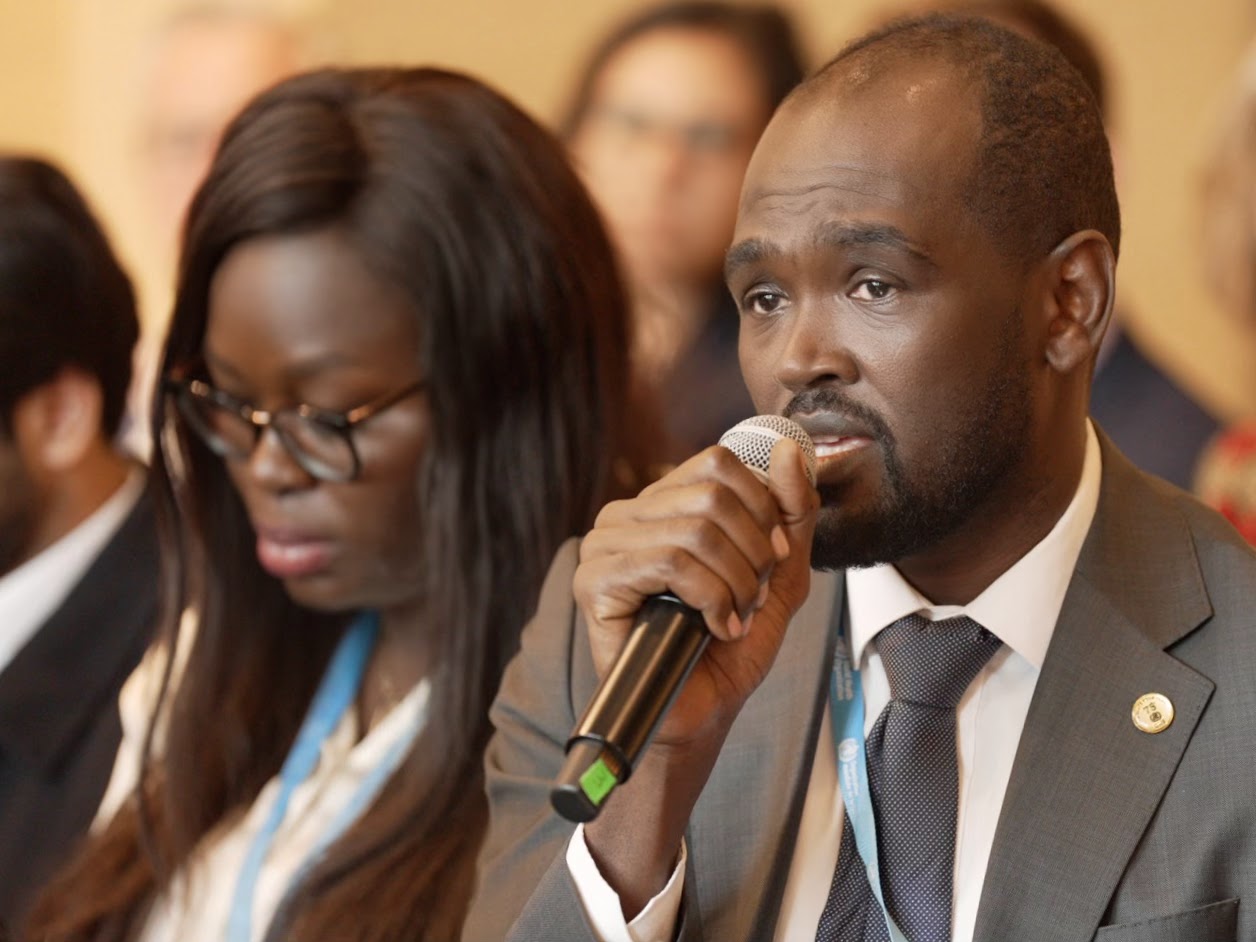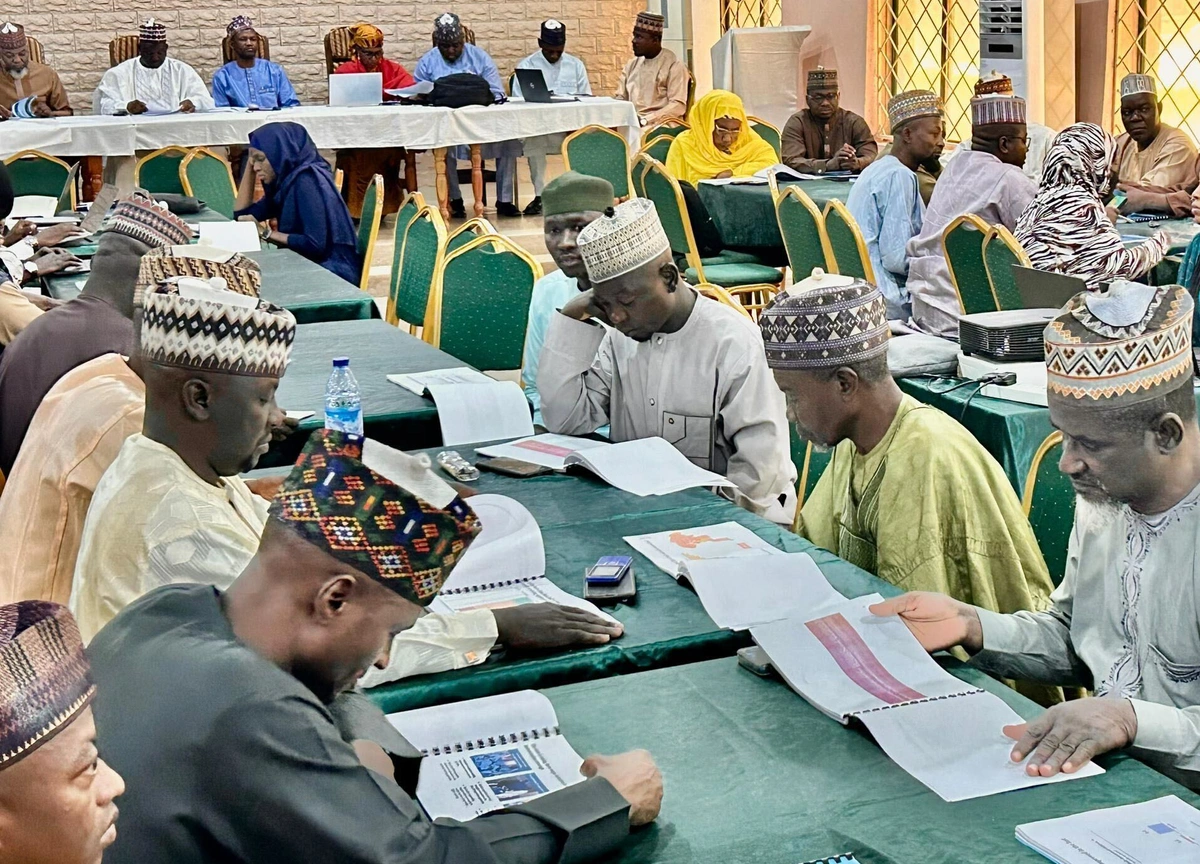
Adversity doesn't stop leaders. It reveals them.
When systems are strained and budgets tight, political commitment makes the difference between well-intentioned plans and tangible progress.
At the 78th World Health Assembly, Oulech Taha, Advisor to Chad's Minister of Health, put it plainly:
"We must stop treating adversity as an obstacle, and start using it as a driver."
In this piece—the first in our Using Adversity as a Driver series—we share four lessons from Acasus' work on how political commitment can be built and sustained, even in tough conditions. Lessons are drawn from leaders we've worked with in various countries, such as Chad, DRC, Mozambique, Pakistan, Afghanistan, and Nigeria.
Oulech Taha, Advisor to the Minister of Health of Chad, speaking at the 78th World Health Assembly in Geneva.
Start with the leader and solve their problems
Leaders are surrounded by challenges. Helping them prioritise where to direct their energy and rally around a bold, compelling goal isn't optional: it's critical.
In Punjab, Pakistan, setting the right level of ambition unlocked far-reaching change. When then-Chief Minister Shehbaz Sharif convened the first Health Roadmap meeting, we came with a bold idea: matching child survival rates with neighbouring Punjab, India, could save 100,000 lives a year. It became a rallying cry. Sharif set new targets and began regular reviews to drive unprecedented progress.
With a bold vision set, we go all in. That means tackling whatever stands in their way, whether or not it's strictly in scope. As Mauro Cuna, Project Manager for Mozambique, puts it: "We go the extra mile for political leaders." That commitment came to life when Mozambique urgently needed to understand demand-side blockers to vaccine uptake. Despite not being in scope, Acasus worked quickly with the Ministry of Health to introduce app-based demand and coverage surveys, to be deployed in communities by teachers within two weeks.
The result: granular and real-time insights on demand and access for EPI and PHC services from 16,000 respondents repeated every year, at zero additional cost. This empowered the Ministry to design new citizen-led interventions, and deepened leadership commitment to data-led reform.
Deliver early wins to build momentum and trust
Delivering early, visible results is the fastest way to build trust and secure lasting leadership buy-in for change. It's not just about delivering early wins for citizens—this also gives leaders the clarity and evidence they need to justify bold action, mobilise resources, and set new expectations, while holding their teams accountable for higher levels of performance.
That kind of internal momentum turns promising progress into sustained impact. As Shaheryar Manzar, Senior Project Manager for Pakistan, noted: "When we give leaders persuasive data, we're not just helping them act, we're helping them convince others to act with them", setting the foundations for long-term change.
In Sokoto, Nigeria, we helped the state to design and embed a governance framework in just four months—without additional funding—that oversees performance in 90% of primary health facilities each quarter. This enables the state's first large-scale, data-led primary care reform, which has helped lead to increased vaccination outputs, and has improved availability of medicines and other essential inputs at facilities
January 2025: An LGA performance review taking place in Sokoto, Nigeria.
Focus on the art of the possible
Governments are led by highly capable experts, but rapid last-mile change is hard. Demonstrating the art of the possible through data, tools, and delivery insights helps leaders act boldly and drive system-wide progress.
We start by solving a myriad of problems at scale, prioritising quick wins. When peers see results, delivered with the same resources in a similar context, it sparks belief and positive pressure: if they can do it, so must we.
But belief alone isn't enough. To turn it into sustained action, we help leaders build accountability through regular reviews, peer comparisons, and simple tools like certificates. These routines create pride, momentum, and the pressure to perform. And when results are visible and peers hold each other to account, change spreads faster.
We saw this in the DRC, where we helped launch the Mashako Plan across nine provinces in 2019. When vaccination coverage rose by 27 points in just 18 months, momentum grew, other provinces joined in, and the government scaled the plan nationwide.
Build with leaders, not for them
Real reform lasts when solutions are co-created and early buy-in is secured, so change is locally owned from the start.
Good reforms are built with government, but they rarely run themselves from day one. Sustainability means staying engaged through delivery, working alongside leaders to solve problems, co-develop solutions, and build capacity.
When leaders can drive delivery with confidence, that's the tipping point when full transition can happen. Then we shift to the next challenge, and the cycle begins again.
In Afghanistan, we began improving facility visibility in 2019 with 700 sites across five provinces. Today, over 3,000 facilities are monitored quarterly—covering 99.9% of those delivering EPI services. Even through instability, routine data helped improve immunisation delivery. This progress came from working alongside the government to build the skills, mindsets, and habits needed to lead. Only once those were in place, the Ministry took over. The system now runs with minimal support: a nearly self-sustaining national model.
A similar story played out in Sindh, Pakistan, where Minister of Health Dr. Azra Pechuho launched an independent monitoring system for rural facilities. She personally shaped the indicators, with a sharp focus on labour rooms and women’s reproductive health. District managers responded because they knew how she would track performance. This co-designed effort led to a 10% rise in institutional deliveries, mostly in public facilities and disproportionately among the least well-off.
In summary: what we've learned
Building political commitment isn't just about sharp presentations or clever strategies. It's about:
-
Setting bold goals. Helping leaders to prioritise and set the right level of ambition.
-
Backing brave leaders. Supporting them to overcome challenges, even when it's not in the original plan.
-
Building momentum. Proving rapid, meaningful change is possible.
-
Giving ownership. Handing over when the time is right, and when change can be sustained locally.
Because in adversity, real leadership shows. And when that leadership is matched with the right support, anything is possible.
Read more from Acasus' Health and Demand Expert, Susan Mackay, on what leaders said about reimagining global health in adversity at last month's 78th World Health Assembly in Geneva.




